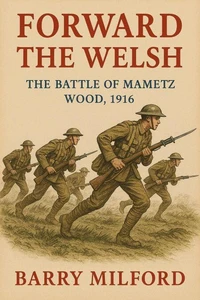"Forward the Welsh"In the summer of 1914, Evan Griffiths is a shop assistant in the Welsh mining town of Ystrad Mynach, content with his quiet life of quarterly accounts and evening walks with his childhood friends Billy and Iwan. When war breaks out, patriotic fervor sweeps through the valleys, but Evan remains reluctant to enlist until social pressure and a sense of duty to his community finally compel him to join the Royal Welch Fusiliers alongside his friends and his older brother Dafydd.
After basic training, Evan's unit is shipped to France as part of the 38th (Welsh) Division. Under the steady leadership of Lieutenant Morgan, a former teacher who speaks to his men in Welsh and understands their valley heritage, Evan adapts to trench warfare while maintaining correspondence with his family back home. The close-knit group of Welsh soldiers-including the massive, jovial Tomos Evans-forms bonds that transcend their civilian backgrounds, united by shared language, culture, and the daily struggle for survival.
As 1916 progresses, the division prepares for the massive offensive planned for the Somme. Evan develops unexpected leadership qualities, earning recognition from Lieutenant Morgan, who sees in him the steady temperament that men follow in crisis. When Dafydd is severely wounded in the catastrophic opening day of the Somme offensive on July 1st, Evan visits his brother in a field hospital, confronting the brutal reality of modern warfare's toll on human bodies and spirits.
The 38th (Welsh) Division is then assigned to capture Mametz Wood-a heavily fortified German position that has repelled multiple attacks by English regiments. The assault represents not just a military objective but a test of Welsh capability within the broader British Army structure. Despite devastating casualties, including the death of Tomos Evans, the Welsh soldiers successfully penetrate the wood's defenses and capture the central German position, proving their worth through extraordinary sacrifice.
The novel concludes with the survivors consolidating their hard-won position, having demonstrated that "Welsh determination proved sufficient against German preparation." Through Evan's transformation from reluctant civilian to battle-tested soldier, the story explores themes of regional identity, the bonds forged through shared hardship, and the human cost of proving oneself worthy in the eyes of history."Forward the Welsh" illuminates a significant but often overlooked chapter of World War I history while honoring the memory of the Welsh miners, shopkeepers, and farmers who left their valleys to fight and die on foreign soil.
"Forward the Welsh"In the summer of 1914, Evan Griffiths is a shop assistant in the Welsh mining town of Ystrad Mynach, content with his quiet life of quarterly accounts and evening walks with his childhood friends Billy and Iwan. When war breaks out, patriotic fervor sweeps through the valleys, but Evan remains reluctant to enlist until social pressure and a sense of duty to his community finally compel him to join the Royal Welch Fusiliers alongside his friends and his older brother Dafydd.
After basic training, Evan's unit is shipped to France as part of the 38th (Welsh) Division. Under the steady leadership of Lieutenant Morgan, a former teacher who speaks to his men in Welsh and understands their valley heritage, Evan adapts to trench warfare while maintaining correspondence with his family back home. The close-knit group of Welsh soldiers-including the massive, jovial Tomos Evans-forms bonds that transcend their civilian backgrounds, united by shared language, culture, and the daily struggle for survival.
As 1916 progresses, the division prepares for the massive offensive planned for the Somme. Evan develops unexpected leadership qualities, earning recognition from Lieutenant Morgan, who sees in him the steady temperament that men follow in crisis. When Dafydd is severely wounded in the catastrophic opening day of the Somme offensive on July 1st, Evan visits his brother in a field hospital, confronting the brutal reality of modern warfare's toll on human bodies and spirits.
The 38th (Welsh) Division is then assigned to capture Mametz Wood-a heavily fortified German position that has repelled multiple attacks by English regiments. The assault represents not just a military objective but a test of Welsh capability within the broader British Army structure. Despite devastating casualties, including the death of Tomos Evans, the Welsh soldiers successfully penetrate the wood's defenses and capture the central German position, proving their worth through extraordinary sacrifice.
The novel concludes with the survivors consolidating their hard-won position, having demonstrated that "Welsh determination proved sufficient against German preparation." Through Evan's transformation from reluctant civilian to battle-tested soldier, the story explores themes of regional identity, the bonds forged through shared hardship, and the human cost of proving oneself worthy in the eyes of history."Forward the Welsh" illuminates a significant but often overlooked chapter of World War I history while honoring the memory of the Welsh miners, shopkeepers, and farmers who left their valleys to fight and die on foreign soil.

 , qui est-ce ?
, qui est-ce ?